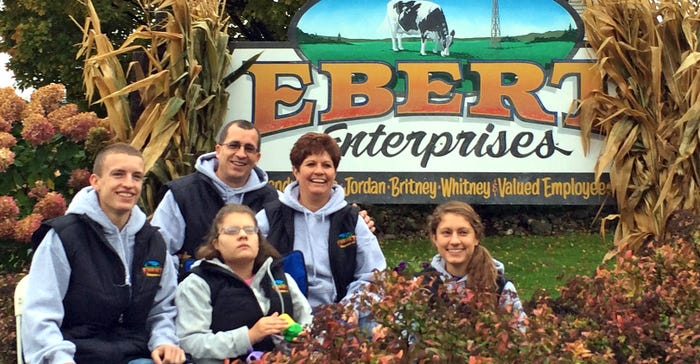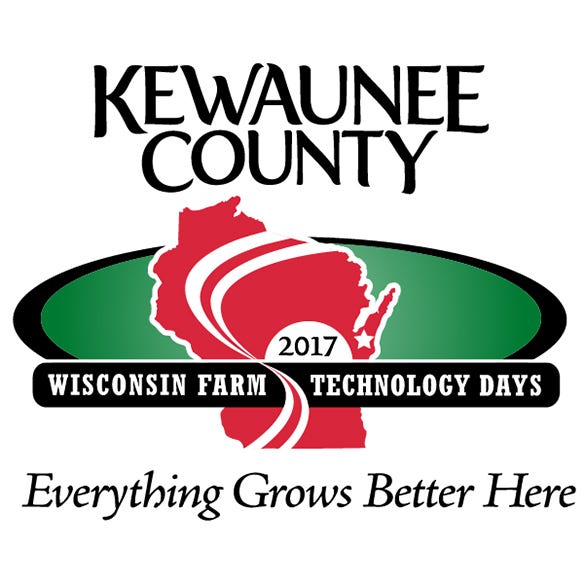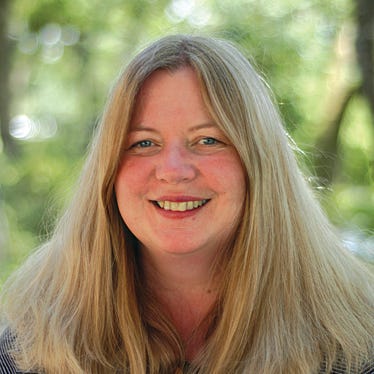
There will be plenty to see and do at the 2017 Wisconsin Farm Technology Days in Kewaunee County. This is the first time in the 63-year history of the show that Kewaunee County has hosted the event.
This year’s show will be held July 11-13 at Ebert Enterprises near Algoma. Ebert Enterprises is owned and operated by Randy and Renee Ebert and their family, and is just 1.5 miles west of Lake Michigan. The couple is the sixth generation of Randy’s family to farm on the home farm. Randy and Renee bought the farm from his parents, Henry and Carol, in 1987. Randy and Renee custom-raised heifers for 10 years before starting to milk in 1997.
Today, Ebert Enterprises is home to 3,000 Holstein cows. The Eberts grow crops on 7,500 owned and rented acres. Between 20% and 25% of the land is double-cropped. They have 40 full-time and 15 part-time employees whom the Eberts greatly appreciate and enjoy working with.
Randy and Renee raised three children on the farm: Jordan, 23, who graduated in May from University of Wisconsin-Madison with a bachelor’s degree in dairy science; Whitney, 20, a junior this fall at UW-LaCrosse; and Britney, Whitney’s twin. Britney, who was born with disabilities, died unexpectedly last year.
“Britney is an important member of the Ebert family,” Randy said during a Media Day event held at the farm on June 6.
“She was my rock,” Renee added.
“Britney brought us together, slowed us down and taught us to appreciate life,” Jordan said. “Even though she is no longer here, it will always be the five of us.”
Farm tours
During WFTD, visitors will not be allowed to walk through the farm buildings, due to biosecurity concerns and the challenge of efficiently moving thousands of people through the 45-acre farmstead. But they can take guided tours on trams.
The farm tour will include a new 80-cow rotary milking parlor built last year. Visitors will also see feed storage, freestall barns and five calf barns that hold 100 calves each. They will see a system that separates the manure into sand, fiber and liquid, and allows the Eberts to recycle some of their sand.
The Eberts’ Holstein herd averages about 80 pounds of milk per cow per day. They feed a ration that is 70% to 80% forages.
“We push forages,” Randy says. “We try to feed them as high of a forage diet as we can.”
Cows are in 300-head groups in the freestall barns.
“It takes about 35 minutes to milk 300 cows,” Randy explains. Two-year-old cows are grouped by age. Older cows are grouped by stage in lactation.
The bottom 35% of the Ebert herd is bred AI to SimAngus bulls. “We started doing this seven years ago because we didn’t want to continue to grow our herd,” Randy says. “We love the hybrid vigor of these calves. We feed them primarily a forage diet. We finish and sell about 50 to 60 SimAngus-Holstein crossbred steers and heifers each month. We shoot for 1,400 pounds to 1,450 pounds in 15 to 16 months. It takes the females a little longer to get that size.”
Holstein bull calves are sold at birth. The Eberts are donating the meat from 12 to 15 SimAngus-Holstein steers for the burgers served at the show.
Field demonstrations
WFTD will feature daily field demonstrations, several theme tents and more than 600 commercial exhibits in Tent City. Experts will be on hand to answer questions about a variety of topics, including animal management and technology, forage and crop production, farm management, fruit management, and water quality.
Specialist Central will give visitors the opportunity to connect with many Extension specialists. Specialists will also present four 30-minute sessions throughout the day on topics related to dairy, farm business and water quality. Free well-water testing will be available on-site.
Joe Stangel, co-chairman of the WFTD Field Demonstrations Committee, says field demos will be held daily from 10 a.m. to noon and from 1 to 3 p.m. on 300 acres of alfalfa and oats.
“They direct-seeded forage oats into the alfalfa because of winterkill,” Stangel explains. “All of the alfalfa will be chopped. We will also be direct-cutting triticale, like in the old days when they green-chopped. The triticale will be chopped into a forage wagon and stored in a bunker silo.”
Demonstrations will include hay mowing, hay merging and hay chopping.
“We will also have disking and tillage demonstrations, and mechanical rock-picking demonstrations,” Stangel says.
Hundreds of equipment manufacturers and dealers from the Midwest will be on-site to discuss visitors’ needs and available options.

Volunteers make the show
The Ebert family and some 1,500 Kewaunee County volunteers have worked countless hours during the past three years to plan every detail of the event, ensuring visitors will see the latest and greatest farm technology Wisconsin agriculture has to offer.
“We have 33 chairs and/or co-chairs,” says Aerica Bjurstrom, Kewaunee County Extension agriculture agent and executive secretary of the show. “We’ve been working really hard to make the show about our community, not just about agriculture. We’ve worked hard to make this a Kewaunee County event. This is a real showcase for the people in our community, too. They’ve done a great job of stepping up to the plate and getting the job done.”
Volunteers are trying to draw people into the community. “We want people to enjoy our community and hopefully come back,” Bjurstrom explains.
Knowing the amount of work necessary to host the show, the host family is very much appreciated for stepping up to offer their farm for the show, Bjurstrom adds. “They want everything to look great and represent Wisconsin and Kewaunee County agriculture well. They’re very sincere and excited to host the show.”
The cost of admission to the show is $8 per person. Children 12 years old and younger will be admitted free. Parking is also free.
“Eight dollars gets you in the door, which is a pretty amazing education and entertainment value,” Bjurstrom says.
Check out the slideshow to learn more about Ebert Enterprises.
About the Author(s)
You May Also Like






